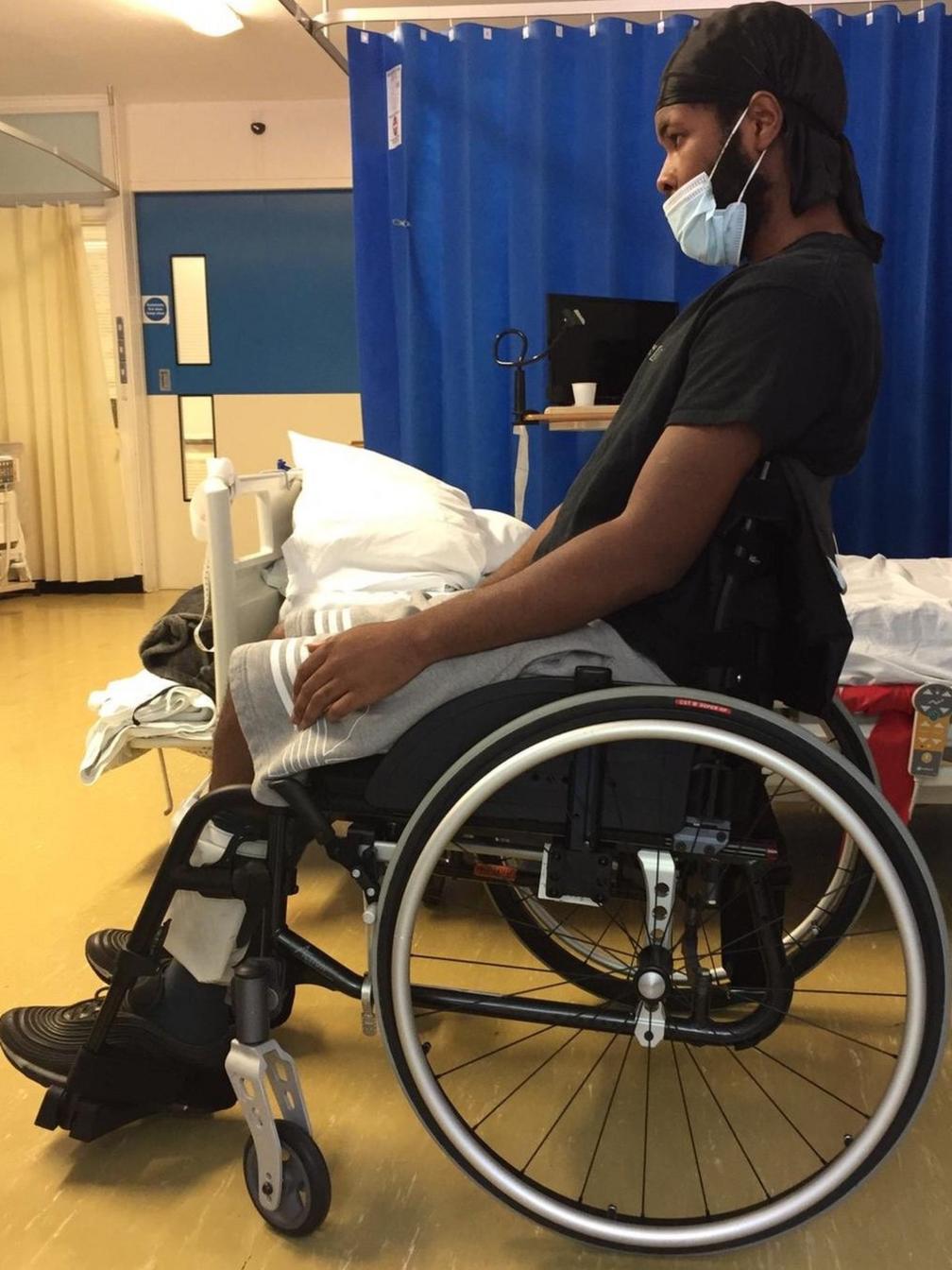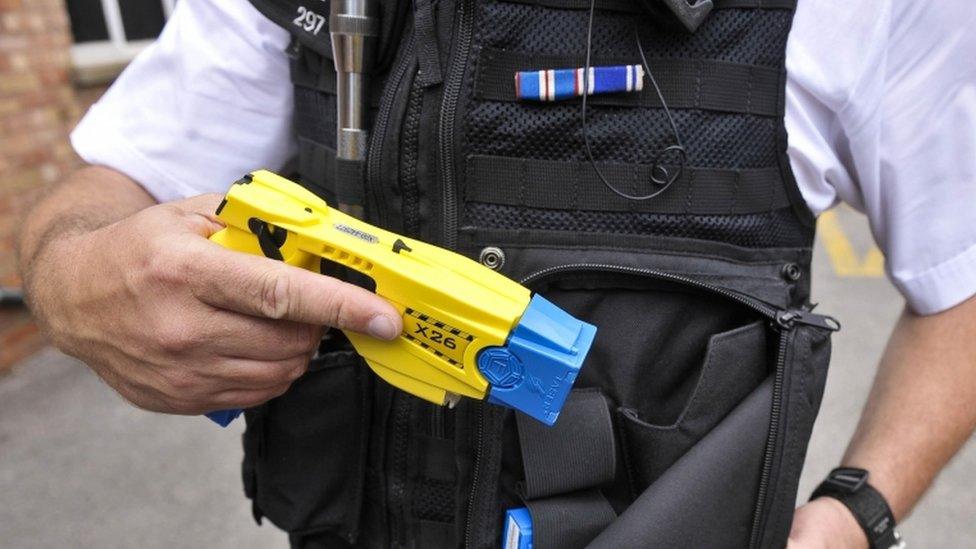Man paralysed in Taser fall says race made him a target
- Published

A 24-year-old man who was paralysed after being Tasered by police last month has told the BBC he believes he was targeted because he is black.
Jordan Walker-Brown fell from a wall while being pursued by two officers.
A Metropolitan Police officer is under criminal investigation by the police watchdog over the incident in London.
It will examine what role ethnicity played in decisions that day amid concerns about the disproportionate use of Tasers on black men.
Mr Walker-Brown has been told by doctors he will never walk again after being paralysed from the chest down during the incident on 4 May.
He was Tasered by a police officer as he fled and jumped onto a wall in Haringey in north London.
He fell from a height of around 2m (6.5ft) and landed on a concrete canal towpath, close to the water.
"I do not pretend to be anyone other than myself," Mr Walker-Brown told the BBC from hospital in a statement released through his lawyer.
"I ran from the police because I had a small amount of cannabis in my possession for personal use - and I had fresh in my mind the memory of a similar encounter with TSG [Territorial Support Group] officers only the previous day when I was mistreated, arrested and charged for possession of a similar amount of cannabis."
'Very fearful'
He said he believed he was targeted by police because he is black.
"I know that I would not have been the subject of police attention, on either day, if I had not been a young black man," he added in the statement.
"And I know, from my own personal experience as a young black man, that I always have to be very fearful of being alone with police officers in a police van: that is an experience to be avoided if at all possible for the sake of my own safety, as most black men know from their encounters with the police."
Jordan Walker-Brown has previously served time in prison.

Jordan Walker-Brown has been told he will never walk again

According to the Independent Office for Police Conduct's (IOPC) summary of events, seen by the BBC, Mr Walker-Brown was being followed by a police van when two officers got out and he started to run.
The officers chased him and both drew their Tasers and Mr Walker-Brown jumped onto a wall.
One officer discharged the weapon which fires two small dart-like electric probes to deliver a high-voltage electric shock.
Mr Walker-Brown fell over the wall and landed on a canal towpath, adjacent to the water.
The IOPC said this summary represents the information presently available. It added the veracity and accuracy of the information will be considered as part of the investigation.
The Home Office has previously said that Tasers "are an important tactical option for officers facing violent situations".
Mr Walker-Brown said in his statement that he recognises the law allowed the police to chase him as he tried to run away.
"But what they are not entitled to do is use a Taser on me when they knew that I did not pose any threat to them whatsoever. I was running away from them," he said.
Mr Walker-Brown has told his sister, Sharn, that he was handcuffed as he lay on the concrete and that officers were trying to make him stand up as he complained that he couldn't feel his legs or body.
Disproportionate use
The most recent figures, external for England and Wales showed, in the year up to March 2019, a black person was involved in nearly 20% of the incidents where a Taser was used. Black, African, Caribbean and black British people represent 3.5% of England's population, according to the Office for National Statistics, external.
The use of Tasers in the England and Wales data covers incidents where they are discharged and not discharged - a Taser can be drawn or aimed, for example, and no electricity is discharged.
Last month, the director general of the IOPC, Michael Lockwood, called for greater scrutiny of Taser use and spoke of the growing concern about its disproportionate use against black men and those with mental health conditions.
Meanwhile, the National Police Chiefs' Council is commissioning independent academic research to look at the issue.
A spokesman said: "We know that trust in the police is lower among some communities. We are listening to the national debate and we are reflecting carefully on our place in it.
"We are now also working towards developing a national plan of action to address wider concerns. This will be delivered with the help of all parts of the police service, and with the support and challenge of our communities - particularly from people of colour with lived experiences."

Tasers fire two small dart-like probes before delivering an electric charge
The IOPC investigation in the Jordan Walker-Brown case will examine, among other issues, whether his ethnicity influenced the officers' decision to stop, pursue and Taser him as well as the aftercare they provided.
His solicitor, Raju Bhatt, believes the watchdog should have carried out a longer investigation into other officers at the scene. He says he has been told they are now being treated as witnesses.
The IOPC said: "It is standard practice to treat officers as witnesses. The evidence which emerges during the investigation may or may not change this."
With other members of the family Sharn, 28, now has to make future plans for her paraplegic brother and is contemplating the "long road" ahead.
They have been unable to visit Mr Walker-Brown in person due to the coronavirus pandemic.
"We're going to have to find suitable accommodation, all those things," she said.
Mr Walker-Brown added: "I have been told that I shall not be able to walk again because of what the police did to me, but I am determined to prove them wrong, just as I am determined to prove that the police are not above the law."
Trevaile Wyse: "I would not have been Tasered if I was white"
- Published20 December 2019

- Published24 August 2019
